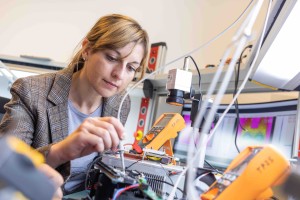Department of Media & Design
Strategic Experience Design
My Studies

Current Curriculum
1. Semester
Accounting and Finance for Experience Design | Seminar (SE) | Coursecode: l230044111
Finance and Accounting Basics
1 SWS
1 ECTS
This course develops the fundamentals of accounting at a national and international level. Students learn to understand and comprehend the accounting cycle (double accounting). They receive basic information about the parameters of company accounts, such as tax regulations. This course aims to enable students to get to know and assess the opportunities and risks involved in international business activities.
Enabling Technology | Seminar (SE) | Coursecode: l230044107
Future and Emerging Technologies I
1 SWS
2 ECTS
In this course, procedure models and innovation methods are learned and discussed in conjunction with technological trends, natural forms of interaction, and disruptive business models. Students are taught a modular approach to implement value-oriented innovation (value-innovation prototyping) independently.
Enabling Technology | Seminar (SE) | Coursecode: l230044108
Production Processes
1 SWS
2 ECTS
Basics of production processes and resources. Fundamentals of product development, production technology, and production development.
Human Centered Design | Seminar (SE) | Coursecode: l230044105
Human Centered Design (UXQCC certification)
3 SWS
4 ECTS
This course gives students an understanding of all the basic information in the human-centered approach. There are well-defined requirements for this, as well as established processes and procedures, summarized in the 'human-centered design process.' This process is depicted by ISO 9241-210. An overview of corresponding processes and integrated methods is provided. This foundation-level certification mainly focuses on common rules and standards for interactive systems. Another topic is integrating usability into the development cycle, while the relationship between service design and organizational development (or transformation) is also developed.
Human Centered Design | Seminar (SE) | Coursecode: l230044106
The Value of Design
1 SWS
2 ECTS
This course is focused on understanding design. Design is more than just an interface or an invitation. Design is a mindset: It's a language that needs to be learned and understood. This course deals with a wide variety of design types, starting with screen design, multimedia design, product design, service design, and process design, while added design value is also explored, from the simplest product design to conversational design, organizational design, and designing complex systems. Added value is generated in all areas and can manifest itself in a wide variety of ways.
Human Centered Innovation | Seminar (SE) | Coursecode: l230044103
Design Research and Requirements for Product Design
3 SWS
4 ECTS
The course outlines the approach to user and stakeholder needs as well as user requirements, based on ISO 9241-210, ISO/IEC 25064, and ISO 25065. The role of user needs in particular is examined in relation to stakeholder needs. The survey of needs is another focus of this course, as is the "implicit" user need. The program deals with user requirements and examines requirements for user interaction and interaction quality. This course conveys how to conduct design research for product design. Students learn when and at what points in the design process timeline they can collaborate with integrated teams in order to achieve the best results with their design research.
Human Centered Innovation | Seminar (SE) | Coursecode: l230044102
Innovation for Product Design
1 SWS
2 ECTS
Students gain a comprehensive understanding of how to strengthen companies' and organizations' innovative capacity through systematic and methodical innovation. In recent years, this kind of systematically structured approach to managing innovations has already become a recognized and required standard in many highly commercially successful companies, and the general principles of it are explained within the framework of this course. Creativity and analysis techniques are applied in practice, and different business cases are used to determine when to implement them. Students explore how corporate culture affects the ability to innovate and what resistances and barriers are to be expected. Groups investigate how existing innovation potential can be raised.
Human Values | Seminar (SE) | Coursecode: l230044104
Human Psychology and Perception
1 SWS
2 ECTS
This course gives students an understanding of the foundations of human perception in order to derive human-centered strategies from them in the future. Understanding the mechanisms of perception is essential to good design. Plus, basic knowledge of conscious and unconscious human behavior and attitudes—as well as the emergence of emotions—is crucial in order for a design to meet users' and customers' actual requirements. These include cognitive biases, noise in behavior, and social influences. This course covers these challenges to good design using the innovative UX Psychology Lens® method and materials, which build a bridge between theory and practical implementation.
Leadership for Experience Design | Seminar (SE) | Coursecode: l230044110
Design Leadership
3 SWS
3 ECTS
In this course, students gain a deeper understanding of management and leadership theories. They differentiate between the concepts of management and leadership, and understand the essential effects of both disciplines. Students can also name several leadership styles and know how to apply them in different situational contexts. Students also get to know a framework that ensures good onboarding and positioning of new managers, and how they can use this to sharpen their positioning and vision as managers and leaders. Persuasion and sales-psychology principles are at the heart of the course, and different applications are discussed as part of practical examples. A personal design vision is developed at the beginning in order to communicate effectively.
Leadership for Experience Design | Seminar (SE) | Coursecode: l230044109
Design Management
1 SWS
2 ECTS
Good design has a positive net effect for everyone involved in a company. As such, 'good design management' is concerned with enabling experience design strategies and reaching people, processes, platforms, and places, and embedding these in the organization as effectively as possible. This course outlines a framework for design management that helps design executives make important decisions and integrate the impact of design into the organization in a scaled way. The concept of 'design ops' is analyzed and developed in detail here. Students also get to know and apply the People/Process/Platforms & Places Design Management Framework. In addition to different operating and motivation models for design teams, students become familiar with the most common design processes, tools, and methods for leading a design team.
Practice and Proof | Project Thesis (PA) | Coursecode: l230044112
Transfer Project I
3 SWS
4 ECTS
In the course 'Transfer Project', students learn how experience-driven product development is carried out through practical examples. In their own practical project, they acquire the ability to formulate recommendations and action strategies for their own company. A real-world company representative discusses the developed strategies with the students. Students are directly prepared for the real world and, at the same time, establish a network that will also be helpful in their later professional life. In addition to professional skills, they are also taught teamwork as an opportunity to achieve a high-quality project result. Critical thinking is promoted through discussion with experts in the field.
Transformation for Strategic Design | Seminar (SE) | Coursecode: l230044101
Design Project Management
1 SWS
2 ECTS
In the course 'Design Project Management' students learn to identify design projects and how to plan, execute, monitor, check, and complete design-oriented projects. They learn how to create a project plan, develop a realistic process, and calculate a budget. Students get to know the ideal composition of an efficient project team in order to be able to apply this knowledge themselves. Each project team in design projects looks different, depending on the scope of the initiative and the competencies required. Ideally, task-appropriate specialists and professionals will be represented in the team. Project managers need to be able to communicate clearly structured tasks and deadlines for each project phase to their team, whether internally or externally. This is explored through numerous tools and examples.
2. Semester
Accounting and Finance for Experience Design | Seminar (SE) | Coursecode: l230044211
Finance and Accounting for Projects
1 SWS
1 ECTS
Students learn the basics of cost accounting, cost-element accounting, cost-center accounting, in-house service-allocation procedures, partial cost accounting, contribution-margin accounting, and break-even analyses. In addition to a theoretical exploration of the contents, the practical implementation is carried out in Excel, including graphic and content preparation. Students get to know Excel as a planning tool for companies and can use Excel itself as a template-based calculation tool. The final goal of the course is to create exemplary, importable data files for IT successor systems such as SAP.
Enabling Technology | Seminar (SE) | Coursecode: l230044209
R&D Management
1 SWS
2 ECTS
The R&D course discusses when research projects can be used in the context of 'design'. Different research levels are examined and typical research processes are discussed. Criteria are defined for selecting a financing program that best meets companies' needs: type of project/activity, type of beneficiary, economic requirements, administrative requirements, type of funding (grant or credit), eligible costs, deadlines, etc. The course also covers the whole life cycle of R&D projects: The idea, selection of consortia, processing of the technical and administrative part of an application, submitting the application, implementation and monitoring, control and audit, using the results, technology transfer, new ideas, and synergies.
Enabling Technology | Seminar (SE) | Coursecode: l230044208
System Thinking and Technology Transformation
2 SWS
2 ECTS
Today's business world is a VUCA world: volatile, uncertain, complex, and ambiguous. This requires a high degree of flexibility and foresight from management and determination in making decisions while at the same time being ready for rapid correction.
Students learn to recognize, understand, and analyze complex relationships. They learn to develop and evaluate options for action, set up feedback loops, and make them usable for the company.
In doing so, not only is it necessary to recognize large correlations, but also to accept the limits to control possibilities and act respectfully in accordance with them. Students learn to distinguish between changeable problems (challenges) and 'gravity problems' (facts).
Students learn to recognize, understand, and analyze complex relationships. They learn to develop and evaluate options for action, set up feedback loops, and make them usable for the company.
In doing so, not only is it necessary to recognize large correlations, but also to accept the limits to control possibilities and act respectfully in accordance with them. Students learn to distinguish between changeable problems (challenges) and 'gravity problems' (facts).
Human Centered Design | Seminar (SE) | Coursecode: l230044207
Experience Methods
2 SWS
4 ECTS
This course focuses on the methods and tools of experience design, from managing expectations to the four basic dimensions of enthusiasm. Based on this, human psychology is merged with methods from design, the film industry, and gaming industries to form an experience model. A 'hook model' has to be designed to bring fun and motivation to every product and system. In this way, we do not design and implement a 'minimum viable product,' but a 'minimum loveable product.' Methods including Creative Intent, Short- Medium- Long Shot, Repetition and Reinforcement, and Hidden Mickey are ways of creating experiences. These methods are used to create a unique experience for all target groups. The course aims to create and design experiences independently as well as in a team.
Human Centered Innovation | Seminar (SE) | Coursecode: l230044205
Design Research for System Design
1 SWS
2 ECTS
Human-Centered Design (HCD) is a specialized discipline combining anthropology, sociology, and human-computer interaction. It combines methods, perspectives, and approaches from these core areas to improve design. HCD was developed using the concepts of life-centered design, which goes beyond humans' consideration and involves other actors, such as processes and organizations. This course focuses on the basics of service design, including its history, approaches, and philosophy. The course also teaches the most important methods and provides practical examples.
Human Centered Innovation | Seminar (SE) | Coursecode: l230044203
Innovation for System Design
2 SWS
2 ECTS
The understanding of the methods, processes, framework conditions, and interrelationships in innovation management are expanded across five key thematic areas: 1. Systematic renewal and revision of business models (business-model innovation). 2. Systematic development of successful products and services (value-proposition design). 3. Opening the innovation process and successfully integrating external resources (open innovation). 4. A successful method that makes it possible to actively influence the economic future, even if it is difficult or impossible to make exact predictions or plans. (effectuation). And finally, 5. An innovation method that breaks with the widespread paradigm of "more and more, better and better" and describes a simplified, application-oriented solution to open up new, price-sensitive segments at the bottom of the socioeconomic pyramid (frugal innovation).
Human Centered Innovation | Seminar (SE) | Coursecode: l230044204
Needs and Requirements for System Design
1 SWS
2 ECTS
This course deepens knowledge on evaluating user requirements. Participants learn about the different types of quality requirements, the UX/usability-related aspects of these requirements, and quality objectives (also known as "usability requirements"). This approach to user requirements is based on ISO 25065 and related standards. The importance and function of requirements in determining the impact on sustainability and ethics are also presented. This field is becoming increasingly important and is researched based on case studies and extensive practical examples. The relationship of user stories as an artifact of agile system development to (user) requirements rounds off this second part on requirements.
Human Values | Seminar (SE) | Coursecode: l230044206
Behavioral Sciences
1 SWS
2 ECTS
This course teaches the basics for sustainable behavioral change in humans. When designing experiences, it is often of central importance to know the possibilities of how to support people in picking up or strengthening positive behavior for their own good (e.g., health) or with a social purpose (e.g., voting in an election). These psychological skills are taught in the course under the umbrella term 'nudging.' Individualizing designs or possibilities for people and motivational theoretical factors such as cheering also play a role, and so are also covered in the course.
Leadership for Experience Design | Seminar (SE) | Coursecode: l230044210
Strategic Management and Applied Leadership
1 SWS
1 ECTS
In this course, students apply theoretical concepts of strategic management and leadership to a business context of their choice. They learn the differences between agile and non-agile strategic management processes, and learn about and apply co-creation tools such as exploration, moderation, coaching, and reverse engineering to strengthen their teams and gain deeper insights. Students know the essential components for analyzing an organization's leadership quality. They also learn about measures that can be taken to increase a company's leadership performance.
Practice and Proof | Project Thesis (PA) | Coursecode: l230044212
Transfer Project II
3 SWS
6 ECTS
In the second semester, students also learn how experience-driven system development is actually carried out by means of practical examples in the course 'Transfer Project.' In their own practical project, students acquire the ability to formulate recommendations and action strategies for their own company. A real-world company representative reflects on the strategies developed.
Transformation for Strategic Design | Seminar (SE) | Coursecode: l230044201
Change Management for design-oriented Transformation
1 SWS
2 ECTS
Students develop a comprehensive understanding of how companies and organizations can respond proactively to permanent changes through strategic design and also implement this in a practical project. Students get to know the different types of changes and their impact on companies. They learn to respond proactively to effects on people and the system using different tools. In the teaching unit, students learn about various tools and methods to efficiently accompany change processes from the outset. Typical errors are explored and discussed from different business case studies.
Transformation for Strategic Design | Seminar (SE) | Coursecode: l230044202
Create Experience Strategies
2 SWS
4 ECTS
This course focuses on experience-based strategies. Students learn how a system is analyzed in an experience-specific way, the fields and touchpoints in which experiences are useful, and the ones in which efficiency is the priority. The seminar includes defining the basis of experiences in a 'core story' for the company. Group work defines which customer interfaces are designed to be experience-oriented and how these are developed based on humans' 'experience needs'. The course aims to produce a strategy that can also subsequently be implemented.
3. Semester
Accounting and Finance for Experience Design | Seminar (SE) | Coursecode: l230044311
Measuring Experience Design
1 SWS
2 ECTS
This course introduces students to the HEART framework, a publicly accessible Google tool that helps to think through, plan, and implement user-centric metrics for products. Students learn about other metrics and learn to develop their own metrics for a wide variety of touchpoints and integrate these into their measurement metrics.
Enabling Technology | Seminar (SE) | Coursecode: l230044309
Future and Emerging Technologies II
1 SWS
2 ECTS
Students deal with past, present, and future innovations in this course, which presents their social influence and opportunities, as well as risks, while a critical examination—as well as students' own impulses—are stimulated in connection with the innovation in question. All aspects of the user experience, technology, and business model have to be taken into account.
Enabling Technology | Seminar (SE) | Coursecode: l230044310
Value Management
1 SWS
1 ECTS
The course 'Value Management' (VM) first presents terms and definitions according to the EN12973 standard. This is followed by an overview of fields where VM can be applied and the difference with value engineering (VE) as a project-oriented approach. After this comes an introduction to the crux of VE, namely the function analysis to identify the functions of the VE object. The next step is to start the extensive case study based on the VE work plan for a VE product prepared. In this case, function costs are determined in the function-cost matrix, formulated as a project objective in the target system with regard to levels of function fulfillment and target costs. In the next step of idea generation, alternative product variants are developed. In a cost-benefit analysis, the variants are evaluated comparatively and winners are determined. These are then proposed as project results, and the selection is justified according to value-analytical aspects.
Human Centered Design | Seminar (SE) | Coursecode: l230044308
Post Industrial and Process Design
2 SWS
2 ECTS
We shape our tools, and then our tools shape us' (McLuhan, 1994). In the meantime, the boundaries between the physical and the digital-virtual sphere have become blurred to the extent that these boundaries can be regarded as non-existent. Products are becoming digital and are combining more and more to create hybrid worlds of experience and information, voice, and gesture control, while smart materials are making interfaces increasingly invisible. As well as esthetic questions, these possibilities for transforming reality also open up philosophical and ethical challenges. Digital media adhere to complex cultural and technological forces of gravity. These technologies' range of requirements and their depth of implementation require the design of the design process itself. How have media changed, and how do design processes need to be adapted to this new reality? These are some of the questions addressed in this course.
Human Values | Seminar (SE) | Coursecode: l230044304
Ethical Understanding and Application
2 SWS
4 ECTS
This course introduces the general concept of ethics in the context of strategy development. Ethics, the understanding of 'good' and 'bad' decisions, and awareness of the consequences of these decisions is a cornerstone of human factors and therefore inherent in human-centered organizations. Applying human-centered approaches offers professionals a broad spectrum of normative ethics that can be used in applied professional ethics. In conjunction with the principles of socially responsible organizations as set out in ISO 26000, ethics in strategic design can be integrated into various phases of defining projects in experience design. Students learn methods and approaches to make ethics tangible in project/strategy decision-making, such as Potter Box, MEESTAR, etc.
Human Values | Seminar (SE) | Coursecode: l230044307
Human Resources Strategies
2 SWS
3 ECTS
Continuous change has more influence than ever on a company's HR strategy. In this course, the topic 'HR Strategy' is examined based on organizational change and issues surrounding change management. Students gain extensive knowledge of the influences on a company's 'HR strategy', the importance of continuously developing this strategy, and the tools themselves to go into the design of such a strategy. There is also a focus on leadership and visionary work.
Human Values | Seminar (SE) | Coursecode: l230044306
New Work and Employee Experience
1 SWS
2 ECTS
This course examines the entire 'employee experience' spectrum, with a focus on new work. In the first phase, students learn why the employee-experience approach is needed today, and which environmental and general conditions lead to dealing with trends, especially new work and overaging. In the second phase, the focus is on the field of new work, analyzing HR strategy, labor law, personnel development, recruiting, and the most wide-ranging current and future concepts of new work. The course aims to provide students with a holistic view of the topics of HR, experience, and new work, and to show them the most wide-ranging spheres of influence.
Human Values | Seminar (SE) | Coursecode: l230044305
Sustainability in Experience Design
1 SWS
2 ECTS
This course introduces the principles of sustainability according to the ISO definition in Guide 82, where sustainability is defined as 'the state of the global system, encompassing the environmental, social and economic subsystems, in which the needs of the present are met without compromising the ability of future generations to meet their needs.' Students learn about the various sustainability goals set by the United Nations (SDGs), as well as the relationships and dependencies between them. The most significant effort in terms of sustainability strategies is to develop a solid understanding of how these goals can be made tangible in direct and indirect aspects of project characteristics. Sustainability aspects within the life cycle of a product, system, or service are also addressed as part of ISO 9241-210.
Practice and Proof | Project Thesis (PA) | Coursecode: l230044312
Transfer Project III
3 SWS
6 ECTS
In this practical project, students acquire the ability to formulate recommendations and action strategies for their own company. This transfer project can serve as a feasibility study for the master's thesis. A real-world company representative reflects on the developed strategies with the students.
Transformation for Strategic Design | Seminar (SE) | Coursecode: l230044301
Change Management for Systems
1 SWS
2 ECTS
The course 'Change Management' deepens understanding and application of the principles of change management. The change-management process for strategies includes goals, key outcomes, and adjustments to existing tasks in implementing strategies. A holistic approach to understanding the need for change, based on Thomas S. Kuhn's paradigm shift, recognizes that every step in an attempt at change needs to be falsifiable, making change management an iterative process. Plus, core objectives that support needs-based change management and are based on human-centered design help to shape and guide change management towards a human-centered (ISO 27500) and socially responsible (ISO 26000) organization.
Transformation for Strategic Design | Seminar (SE) | Coursecode: l230044302
Company-wide Experience Strategy
2 SWS
2 ECTS
The course explores the reasons to have a company-wide strategy. Creating a new strategy requires in-depth knowledge in order to implement it positively and sustainably. Different questions are explored: Who do you create this strategy with? How can you reach a consensus between all parties involved? Who are your partners for bringing about far-reaching change? The crux of this course is to lead a company towards a 'customer-first' or 'customer-centric' culture.
Methods and tools are explained in detail, including KPIs, team goals, individual goals and measurement systems, tools for customer or employee feedback, and measuring progress towards a customer-oriented organization.
Methods and tools are explained in detail, including KPIs, team goals, individual goals and measurement systems, tools for customer or employee feedback, and measuring progress towards a customer-oriented organization.
Transformation for Strategic Design | Seminar (SE) | Coursecode: l230044303
Design for Meta and Macro Trends
1 SWS
2 ECTS
The course 'Design for Meta- and Macro-Trends' includes developing design foresight, which involves attempting to understand and map out the future. This seminar aims to present frameworks and methods that increase companies' resilience to changing consumer wants, market dynamics, and legal framework conditions. Design foresight is about understanding how different forces can affect the future business environment and transforming these insights into strategies to make the company future-proof. The teaching unit focuses partly on the effects of new technologies such as artificial intelligence, machine learning, and blockchain, but also on decarbonization and decentralization to help participants to better deal with the (positive and negative) effects of these disruptive forces.
4. Semester
Research and Masterthesis | Master's Thesis (MA) | Coursecode: l230044403
Master Examination
0 SWS
1 ECTS
Examination, presentation and defensio of master's thesis
Research and Masterthesis | Master's Thesis (MA) | Coursecode: l230044402
Master Thesis
0.5 SWS
25 ECTS
This course teaches the following contents: - Independent implementation of a research project - Independent preparation of a scientific master's thesis - Presentation and defense of the master's thesis - Examination discussion on curriculum-relevant content.
Research and Masterthesis | Seminar (SE) | Coursecode: l230044401
Master Thesis Seminar
4 SWS
4 ECTS
Students are accompanied professionally and scientifically in the process of preparing their master's thesis. Discipline-specific competencies andscientific skills and abilities are consolidated.





